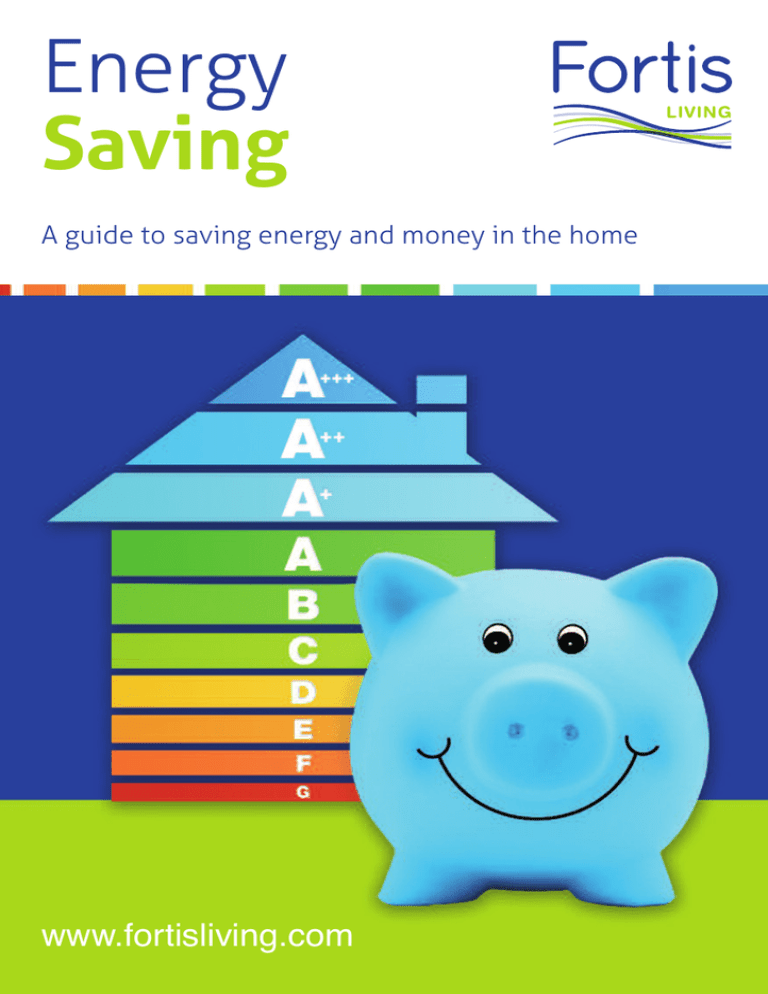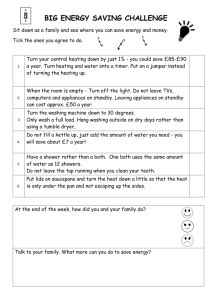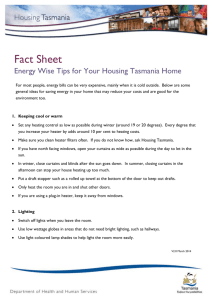Energy-Saving-Booklet
advertisement

Energy Saving A guide to saving energy and money in the home www.fortisliving.com Contents Page Section 1 Introduction 2 Heating comparison cost 3 Cost of running appliances 4-6 Energy saving tips 7 Standby to save even more 8 Seeing your energy bills reducing 9 Switching tariff or supplier 10 Useful contact numbers including mobile friendly ones Introduction Why save energy? Most importantly it’s good for your purse or wallet. Saving energy means that you are saving money. With the ever increasing price of fuel and the cost of electricity nearly doubling since 2002, there has never been a better time to be more energy efficient. Cutting unnecessary wastage will make it more affordable for essential things like heating. Would you like to reduce your energy bills but don’t know where to start? Well, understanding how much energy appliances and heating systems use and how much that costs is a good place to start. This booklet contains lots of useful information on energy consumption and costs and we have included our top tips for saving energy. This will help to get you started 1 Heating comparison cost (Cost based on September 2014 average cost of 15.2p per kWh for electricity and 5p per kWh for gas) Fuel Appliance cost per hour Gas Gas fire on full on medium on low 11p 7p 4p (including water heating) 43p 22p 17p Wall-mounted gas flued heater on full 6p on medium 5p on low 3p Oil filled radiator 1kwh 13p 2kwh 26p 39p standard Tariff 18p off peak From these comparisons you can see that using an electric fan heater to heat one room can cost the same as using your gas central heating system to heat the whole house and the hot water. Electric 39p 26p 13p 26p *Cost is for each storage heater and is based on an Economy 7 off peak tariff average of 6p per kw. 95p 68p 23p Bar fire 3 bars - 3kW 2 bars - 2kW 1 bar - 1kW Convector heater 2kW Storage heaters - overnight charges 400w per 7hr - 2.8kw 17p 800w per 7hr - 5.6kw 34p 1100w per 7hr - 7.7kw 46p 1400w per 7 hr - 9.8kw 59p 1700w per 7hr - 11.9kw 71p 2500w per 7hr - 17.5kw £1.05 3400w per 7hr - 23.8kw £1.43 Heating is thermostatically controlled so the lower the temperature outside the harder the boiler has to work to achieve the required heat indoors which in turn increases the running cost. Bottled gas Calor gas heater on full on medium on low 26p Immersion water heater Immersion water heater Economy 7 Gas central heating in very cold weather in cold weather in mild weather Fan heater 2kwh Using your heating system or storage heaters incorrectly can increase your energy consumption significantly which will lead to higher bills. User instructions for all heating systems are generally available to download on the internet or alternatively contact our Home Energy Advisor for more information. 2 Cost of running appliances (Cost based on September average cost of 15.2p per kw) Kettle 2.5kwh 37.5p per hr Toaster 1kwh 15.2p per hr Bath (150 litre water heated by electric immersion heater) 90p per bath Energy efficient light bulbs Microwave 800w 12.16p per hr Slow Cooker 100w 2p per hr Old style lightbulb Fridge Freezers use approx. 1 to 2 units per day so between 15p and 30p a day. Electric Hob/ Ring 1kwh 15.2p per ring per hr Gas Ring 4p per hr Gas Oven 7p per hr Iron 2kwh 40.4p per hr (equivalent light to 15w energy saving bulb) 100w =1.5p per hr Fairy Lights string of 80 standard .3w bulbs on for 6 hours a day =2p a day LED bulbs on for 6 hours a day 0.33p (less than a 1/3rd of a penny) a day Desktop Computer The average PC needs one unit of electricity to run for 3 hours (15.2p) so approximately 5p per hour. Laptops are much cheaper at less than a penny per hour. Washing Machine Approx 50p per 1 hr wash Tumble Dryer approx 50p-60p per load Hairdryer 1600w 24.3p per hr Straighteners 15w=0.2p per hr 8p per hr Games Consoles on average use one unit of electricity (15p) to power 3 hours of gameplay so approx 5p per hour, The Wii is slightly cheaper and PS3 slightly more. Electric Shower 9kwh 23p for 10 minutes or £1.37 per hr Shower (Gas heated hot water) 13p for 10 minutes or £0.78 per hr DVD/Video 12 hours 7p Bath (150 litre water heated by Gas boiler) 31p per bath TV 12 hours 7p The wattage for the appliance is usually stamped on the bottom or back of the appliance on the nameplate. Many appliances have a range of settings so the actual amount of power an appliance uses depends on the setting. For example, a radio set at high volume uses more power than one set at low volume. 1000 watts = I kW. I kWh costs approx. 15p. 3 Energy saving tips There are lots of ways to save energy or use it more efficiently at home. Most cost nothing, some cost a little but they will pay for themselves in no time with the savings made. Lighting above this will add an extra £65 a year to your gas bill. Fit lower wattage or energy efficient bulbs wherever possible. They use less than a quarter of the energy of traditional bulbs and create the same amount of light. This gives considerable savings over the lifetime of the bulb. I I If you have thermostatic radiator valves (TRVs) you can use them to control the temperature of the heating in the rooms that you are using and turn them down or off in a room when you are not using it. Please note that rooms not in use should be heated occasionally to avoid the risk of condensation and mould growth forming. I Keep your lampshades and bulbs clean, they give out less light if they are dirty. Dark lampshades give out less light so use lighter shades to make the most of the light. I If you are feeling chilly, put on an extra layer of clothing before you turn the heating up. An extra jumper or a pair of socks could make all the difference and I save you money. Turn off any lights you don’t need, but do make sure you have enough lighting on stairs and hallways. Plug-in led night lights are cheap to buy, cheap to run and give out enough light on landings etc to not have a light on overnight. I Hanging thermal curtains or adding a thick lining to your existing curtains can help keep the heat in and close them as soon as it starts to get dark. Using draught excluders at doors keep the I heat in the room that you want it. Spotlights and external flood lights are more expensive to run than other lighting, so avoid leaving them on for I long periods. Use the right tog duvet to avoid using heating overnight. Use a lower tog for the summer and a higher one for the winter. You can get an all season I 3 in 1 duvet. Fluorescent tubes give out more light and are the best choice for kitchens. I Heating The recommended temperature for sitting rooms and bathrooms is 21°C. For every 1degree that you have it 4 Why not try a hot water bottle instead of an electric blanket? It’ll be cheaper, safer and will still keep you warm. Use leftover water from the kettle when making a hot drink to fill it up. I If you use a tumble dryer, spin your clothes first. They’ll dry in the tumble dryer more quickly. Also use a dryer ball in the tumble dryer. This separates the clothes and helps them to dry quicker. I Get some extra blankets and keep them near to the bed to put on if you feel cold I during the night Make sure the filters in your tumble dryer are fluff free. A blocked filter prevents the hot air from circulating freely so it takes longer to dry the clothes. I Bathing Do the ironing in batches rather than one or two things at a time will reduce the amount of electricity used. You can reduce the amount of creasing on tumble dried clothes by lowering the heat on your tumble dryer and hanging or folding your clothes as soon as the cycle has finished. I Aim to take a shower rather than a bath. A five minute shower will save approximately 60 litres of water compared to filling an average sized bath and save lots on water heating costs. There are lots of water saving devices available, many of which I are free. Cooking Laundry Only fill kettles with as much water as you need. Make sure there’s enough water to cover the element when using I an electric kettle. Always try to put a full load of washing into your washing machine or tumble dryer. I Save energy by washing at lower temperatures. Washing clothes at 30°C instead of a higher temperature can use around 40% less electricity. I Use economy programmes on your washing machine for small loads or washing which isn’t very dirty. When cooking vegetables, use just enough water to cover the food and put a lid on the pan to keep the heat in. Simmer instead of boiling; less steam means less need to ventilate the room, avoiding condensation buildup. I Always use the right size of pan for your cooking ring. Use a stacking steamer when possible, this will cook three times the amount of food for the same price as one pan. I I Whenever possible, dry washing outside. Don’t hang your washing over radiators as you will cause condensation and use more money in heating. Use an airer I instead. Don’t keep opening the oven door while you are cooking. I 5 Energy saving tips Make toast in a toaster, not under the grill. Other Appliances I TV’s, DVD’s and Hi-Fi’s use up to 90% energy in standby mode. Make sure they are turned off at the socket. Or use a power down device which will automatically turn them off when you switch off your appliances. I Use a microwave instead of the oven wherever possible, they’re quick, easy and economical to use. They’re not just for reheating and defrosting, but for I fresh food too. Try to buy ‘A’ rated appliances and switch them off at the wall when not in use. You’ll be surprised how much you save! It can be a little more expensive but by buying a highly efficient appliance, you will save money and energy in the long run. Look out for the energy rating labels. I Don’t forget to turn off the gas on the hob as soon as you have finished cooking. Never use a gas cooker to heat I the room. Fridges and Freezers Don’t position your fridge or freezer next to a cooker or in the sun. Make sure air can circulate around the back of your fridge or freezer and keep the back I dust free. Towel dry your hair so you don’t have to I use your hairdryer as much. Try not to leave phones or other items charging overnight. A few hours are usually all that’s needed. Chargers I can be a fire hazard if left on. Load and unload the fridge as quickly as possible. Don’t leave the fridge door open for longer than you need to. Fill the gaps in your freezer with carrier bags full I of scrunched up newspaper. Dishwashing If you are using a dishwasher, wait until you have a full load before putting it on and use the economy programme wherever possible. Also, pre-rinse dishes in cold I water not hot. Never put hot food in a fridge or freezer. I Let it cool first. Defrost your fridge or freezer regularly to keep it working efficiently. Ice should never be more than a quarter of an inch (6mm) thick around the ice box and make sure the door seals work effectively. I If you are washing dishes by hand, use a bowl or put the plug in the sink and don’t leave the tap running. Save your dishes until you have a bowl full to wash up in I one go. 6 Standby to save even more Did you know that the average household wastes around £68 a year on standby alone and that some appliances can be using as much as 90% of the energy that they would use when switched on? Annual energy usage while on standby for a Television (Plasma) £4.87 Annual energy usage while on standby: Wireless Router (e.g. BT Hub) £21.92 CD player / Tuner £4.87 Printer (Laser) £18.26 Television (Plasma) £4.87 Set-top (Satellite) £18.26 Video Player £4.87 Amplifier £2.18 Inkjet printer £4.26 Compact Hi-Fi £12.18 Desktop PC £3.65 iPad charger £12.18 Nintendo DS £3.65 Nintendo Wii £12.18 Oven (Electric) £3.65 Set-top box (Freeview) £7.31 Microwave £3.04 Alarm Clock £6.09 Television (CRT & LCD) £3.04 Microsoft Xbox 360 £6.09 Mobile phone charger £2.44 Modem £6.09 PC monitor (CRT) £2.44 Sony PlayStation 3 £6.09 Electric toothbrush £1.22 Air freshener plug-in £4.87 Childs night light £0.73 7 Seeing Your Energy Bills Reducing This booklet is full of energy saving ideas but how will you know if they have worked. The best way is by seeing your bills go down. Take regular meter readings to calculate how much you have used. Energy is charged by kWh (a kilowatt hour). On your electricity meter, each unit =1kWh which costs approximately 15p (depending on your tariff.) On your gas meter it is a little bit more complicated to measure as the number of units have to be converted Reading Date Reading Units Used Cost Electricity Date to kWhs using a small calculation. A very rough estimate for gas is that 1unit = 11 kWhs. A kWh of gas costs approx. 4.5p so 1 unit is approx. 49.5p. So let’s get started. Take a meter reading and record it in the table below. Take regular readings to compare how much energy you are using. You can compare daily, weekly or monthly usage, just remember to divide it by the number of days between readings to get a more accurate comparison. Convert to kWhs Cost Gas Units Please remember that you will need to add vat and your daily standing charge to these amounts. 8 Switching tariff or supplier You don’t always need to switch suppliers to get a better deal. Energy suppliers now have to tell you what the best/cheapest tariff is that they can offer you. You can usually switch tariffs within your current supplier without any penalties even if there is an exit fee. Suppliers bring out new tariffs regularly so always check your bill for any information regarding cheaper tariffs that are available. Also look on their websites or give them a call. If you do want to switch suppliers, use the switching sites that have been accredited by the Ofgem Confidence Code. These sites compare different energy suppliers prices, show how much money could be saved and provide an easy to use switching service. It is free, fast and simple to switch and they take care of all the paperwork, you just sit back and wait for your new supplier to contact you with a start date of your new service. You could also use the My Home Energy Switch as recommended by the National Housing Federation. You can call them on 0800 0014706 or online at www.myhomeenergyswitch.org Accredited Comparison Sites: www.energyhelpline.com Tel No 08000740745 www.energylinx.co.uk Tel No. 0800 8497077/01259220000 www.moneysupermarket.com Tel No. 08001777087 www.simplyswitch.com Tel No. 0800111395/03332528191 www.theenergyshop.com Tel No. 08453307247 www.uswitch.com Tel No. 08006888244 www.unravelit.com Tel No. 08008620021 www.myutilitygenius.co.uk Tel No. 02034680461/08444145875 www.which.co.uk/switch Tel No. 01259220235/08004101149 Please note that some of these numbers are not free from either a landline or a mobile. 9 Useful Contact numbers Including mobile friendly ones Don’t know who your gas supplier is? Contact Meter Number Helpline: Gas 0870 6081524 In the event of a power cut contact: Western Power Distribution 0800 6783105 Don’t know who your Electricity supplier is? Electricity 0845 6030618 Severn Trent 03457 500500 Welsh Water 0800 0520145 Dee Valley Water 01978 846946 Energy Suppliers Numbers Landline Mobile Friendly British Gas 0800 0480202 0333 2002026 Scottish Power 0800 0270072 03452700700 Eon 0345 3024294 0333 2024606 EDF 0800 0969000 01138207117 Npower 0800 0733000 03301003000 SSE 0800 9808476 First Utility 01926 320 700 Energy Saving Trust has a network of Energy Efficiency Advice Centres providing free, impartial, expert advice. Their aim is to help consumers reduce their energy use and save money. You can contact them on tel number 03001231234 or online at www.energysavingtrust.org.uk Home Heat Helpline 0800 336699 provides advice for people having difficulty paying their fuel bills. 01926 320 700 If you would like to find out more about Fortis Living please visit our website: www.fortisliving.com or E-mail: info@fortisliving.com Please note: All information is correct as at January 2015.

